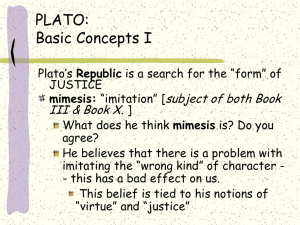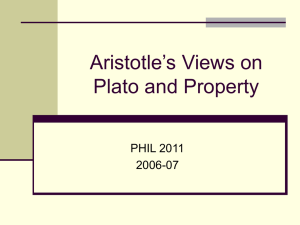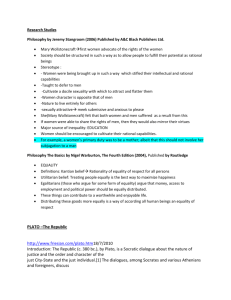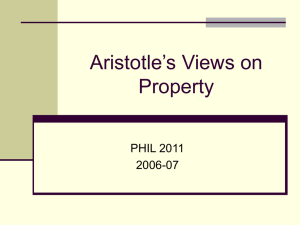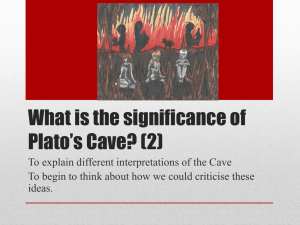Plato - NHSPoliticalScience
advertisement
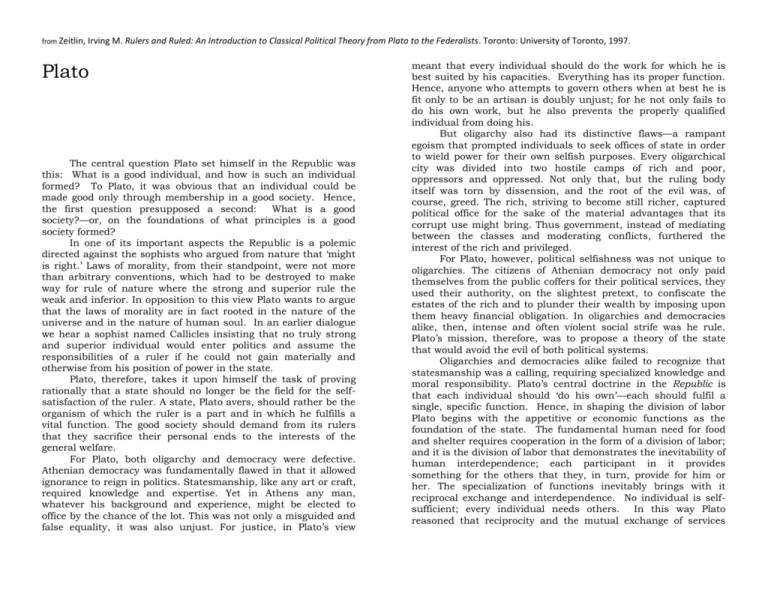
from Zeitlin, Irving M. Rulers and Ruled: An Introduction to Classical Political Theory from Plato to the Federalists. Toronto: University of Toronto, 1997. Plato The central question Plato set himself in the Republic was this: What is a good individual, and how is such an individual formed? To Plato, it was obvious that an individual could be made good only through membership in a good society. Hence, the first question presupposed a second: What is a good society?—or, on the foundations of what principles is a good society formed? In one of its important aspects the Republic is a polemic directed against the sophists who argued from nature that ‘might is right.’ Laws of morality, from their standpoint, were not more than arbitrary conventions, which had to be destroyed to make way for rule of nature where the strong and superior rule the weak and inferior. In opposition to this view Plato wants to argue that the laws of morality are in fact rooted in the nature of the universe and in the nature of human soul. In an earlier dialogue we hear a sophist named Callicles insisting that no truly strong and superior individual would enter politics and assume the responsibilities of a ruler if he could not gain materially and otherwise from his position of power in the state. Plato, therefore, takes it upon himself the task of proving rationally that a state should no longer be the field for the selfsatisfaction of the ruler. A state, Plato avers, should rather be the organism of which the ruler is a part and in which he fulfills a vital function. The good society should demand from its rulers that they sacrifice their personal ends to the interests of the general welfare. For Plato, both oligarchy and democracy were defective. Athenian democracy was fundamentally flawed in that it allowed ignorance to reign in politics. Statesmanship, like any art or craft, required knowledge and expertise. Yet in Athens any man, whatever his background and experience, might be elected to office by the chance of the lot. This was not only a misguided and false equality, it was also unjust. For justice, in Plato’s view meant that every individual should do the work for which he is best suited by his capacities. Everything has its proper function. Hence, anyone who attempts to govern others when at best he is fit only to be an artisan is doubly unjust; for he not only fails to do his own work, but he also prevents the properly qualified individual from doing his. But oligarchy also had its distinctive flaws—a rampant egoism that prompted individuals to seek offices of state in order to wield power for their own selfish purposes. Every oligarchical city was divided into two hostile camps of rich and poor, oppressors and oppressed. Not only that, but the ruling body itself was torn by dissension, and the root of the evil was, of course, greed. The rich, striving to become still richer, captured political office for the sake of the material advantages that its corrupt use might bring. Thus government, instead of mediating between the classes and moderating conflicts, furthered the interest of the rich and privileged. For Plato, however, political selfishness was not unique to oligarchies. The citizens of Athenian democracy not only paid themselves from the public coffers for their political services, they used their authority, on the slightest pretext, to confiscate the estates of the rich and to plunder their wealth by imposing upon them heavy financial obligation. In oligarchies and democracies alike, then, intense and often violent social strife was he rule. Plato’s mission, therefore, was to propose a theory of the state that would avoid the evil of both political systems. Oligarchies and democracies alike failed to recognize that statesmanship was a calling, requiring specialized knowledge and moral responsibility. Plato’s central doctrine in the Republic is that each individual should ‘do his own’—each should fulfil a single, specific function. Hence, in shaping the division of labor Plato begins with the appetitive or economic functions as the foundation of the state. The fundamental human need for food and shelter requires cooperation in the form of a division of labor; and it is the division of labor that demonstrates the inevitability of human interdependence; each participant in it provides something for the others that they, in turn, provide for him or her. The specialization of functions inevitably brings with it reciprocal exchange and interdependence. No individual is selfsufficient; every individual needs others. In this way Plato reasoned that reciprocity and the mutual exchange of services between ruler and ruled could displace the self-seeking in which one strives to get everything for oneself. Plato’s aim then was to design a state in which all citizens must be set to the specific tasks for which their natures have fitted them, so that the whole society becomes not a multiplicity of interest groups and factions, but rather an organic unity. Plato begins the construction of his ideal state by enunciating the principle of specialization as justice. He divides the state into three classes: the rulers, the warriors, and the farmers-producers. Each of the three classes is assigned its specialized function, and each is to concentrate exclusively on the discharge of that function. Plato denies private property to both the rulers and the warriors, seeking thereby to free then from any temptation to pursue material interests. Plato believed that communism is necessary for the rulers because experience had shown that wherever economic and political power are held in the same hands, corruption of government is inevitable. The property-less rulers are to live on an income paid in kinds by the farmerproducer class, who in their subordinate status would presumably be willing to make such payments. He imagined that if a distinct class were designated for the work of government that would eliminate the struggle for power so characteristic of other political systems. Moreover, if each class remained within its boundaries, concentrating on its exclusive function, there would be no reason for one class to come into conflict with another. Selfishness, for Plato, meant trespassing on another’s sphere; so a properly trained governing class would never commit such trespass. To instill the virtue of selflessness in this class, Plato subjects its candidates to a demanding and rigorous series of trials and tests; and only those who have distinguished themselves by their dedication to the common weal of the state are admitted. Besides the spiritual education for unselfishness, Plato introduces the material guarantee of communism: the rulers are to have no family, nor any home or private property of their own. With communism, Plato assumed, the rulers would have no temptation to selfishness, no material interest in holding their positions of authority. With the rulers having nothing in private possession but their bodies, and everything else in common, one could count on their being free from the dissension that arise among individuals from the possession of family and property. That is the way Plato proposes that each should do his own specialized work in contentment. The fundamental principle of social life is ‘justice’ –which for Plato means neither more or less than an individual’s fulfilment of the role assigned to him in the interest of society…. The warrior is the guardian of the state. Here Plato characteristically employs an analogy: the guardian, like a watchdog, must be gentle to those he guards, but ferocious to every stranger. The watchdog possesses the cognitive capacity to distinguish between friend and foe. Likewise, the guardian of the state must develop his faculty of reason so as to recognize an enemy deserving of attack. In the warrior, reason is mixed with the soul-element of spirit, by which reason is aided. But reason in its purest form expresses itself not in the guardian, but the ‘perfect guardian,’ or ruler. The class of guardians is now split by Plato into two: the military guardians whose chief characteristic is ‘spirit’ and who are now termed ‘helpers,’ and the philosophic guardians whose chief strength lies in their superior capacity for reasoning. The real ruler of the Republic must be a philosopher; but the philosophic faculty is present in only a few, rare souls. Philosophy, or the love of wisdom, says Plato, is impossible to the multitude. Candidates for rulership will be carefully selected and subjected to an elaborate system of intellectual and moral tests. The state is capable of perfection if it is guided by a superlative, philosophic reason. This is the underlying premise of the Republic: the state is the product of the human mind. Either philosophers must become kings, or present-day kings must become philosophers, so that political power and philosophical intelligence are joined. The rule of the ‘philosopherkings’ may be either a monarchy or an aristocracy. Whether it is one who rules or a few, their power is absolute in the sense that it is uncontrolled by any written law. Although Plato makes no provision for the written law-code, he does lay down certain principles: (1) the rulers must guard against intrusion into the state of extremes of wealth and poverty; (2) the size of the state must be limited so as to be consistent with unity and selfsufficiency; (3) the rulers must maintain justice in Plato’s peculiar sense—that is, they must ensure every citizen is occupied exclusively with the fulfillment of his specific function. Plato imagines that the philosopher-rulers will be loved by those they rule because they are their wise helpers, not their masters. The rulers, in turn, will love their subjects to whom they owe their sustenance. Ruler and subjects will be bound together by mutual need, respect, and gratitude. To the philosophers and guardians Plato now adds a third class—the class of producers who fulfil the fundamental economic function. Like the philosopher-rulers and the warriors, the members of the third class by far the vast majority of the populace—will also confine themselves to a single function. So the Platonic state as a whole is a society consisting of a division of labor between three specialized classes: the rulers or ‘perfect guardians’; the warriors; and the producing classes, who Plato calls the ‘farmer.’ In fairness to Plato, we need observe that he acknowledges the possibility that individuals of one class may possess the faculties required for another. When that occurs, such individuals should be enabled to rise to the class to which their capacities entitle them.


